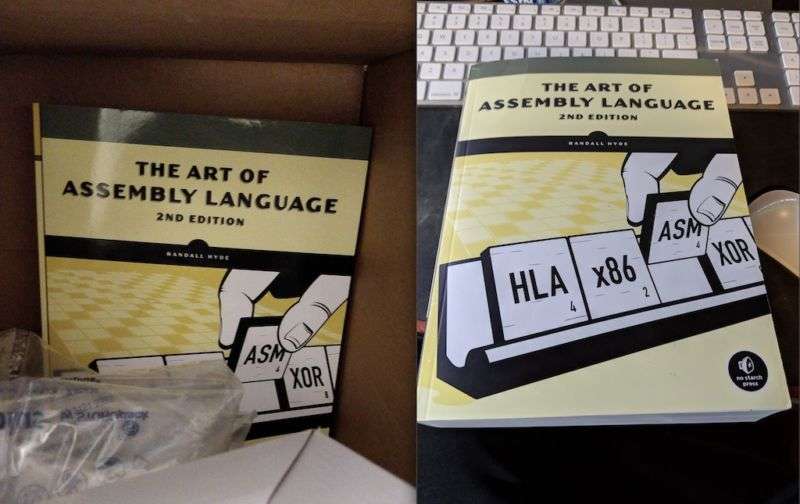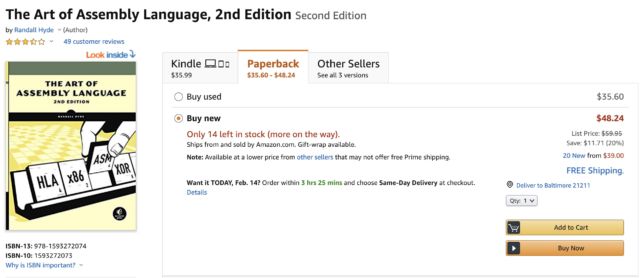
Amazon caught selling counterfeits of publisher’s computer books—again

Bill Pollock, the founder of the tech how-to book publisher No Starch Press, called out Amazon on February 13 for selling what he says are counterfeit copies of his company’s book, The Art of Assembly Language—copies that Amazon apparently printed.
Just discovered today a new case of copyright infringement directly by AMAZON’S CREATESPACE. Not the first time! This is obviously NOT printed by No Starch. Kindly report any other cases to us. Please RT and share. @amazon @nostarch pic.twitter.com/ayjebwTiOI
— Bill Pollock (@billpollock) February 2, 2019
One of the Amazon printed fakes. Note the poor spine wrapping. @nostarch pic.twitter.com/3pcm0BYVHN
— Bill Pollock (@billpollock) February 12, 2019
After Pollock’s post on Twitter on Wednesday, other people posted pictures of other No Starch books that had been counterfeited through Amazon, including books that had pages poorly cut. What’s even crazier is that this isn’t the first time this has happened.
In 2017, Pollock got reports of Amazon selling counterfeit copies of Python for Kids, a popular children’s introduction to programming, and four other No Starch titles. The books were easy to distinguish from No Starch’s production runs because of the poorer quality of the paper and binding, changes likely resulting from Amazon’s print-on-demand production.
Images of counterfeit copies of Python for Kids being sold on Amazon. Legit copies are thicker, color, layflat binding, nicer paper. @amazon pic.twitter.com/P1tRBnKcvc
— Bill Pollock (@billpollock) March 21, 2017
Amazon markets the service to publishers as a way to have “100 percent availability of books” internationally, and the company has enrolled a number of publishers. The service is part of Amazon’s CreateSpace offering, which allows content creators to self-publish both electronically (through Kindle) and in print. Authors and publishers are forced to police Amazon’s marketplace themselves for counterfeit books—and the same is true of other products sold through Amazon.
The problem is that Amazon apparently doesn’t police whether book content uploaded to CreateSpace actually belongs to the person doing the uploading. As others who sell through Amazon have discovered, Amazon has had a problem with mixing legitimate and counterfeit products in fulfillment warehouses because of how it prepositions product for Prime Delivery.
Two years ago, Amazon launched an effort to crack down on counterfeit goods sold through Amazon’s Marketplace using a brand registry, but book pirating through CreateSpace has continued unabated. Such pirated titles are being sold directly by Amazon, not through third-party Marketplace sellers. Earlier this month, Amazon executives admitted in the company’s earnings report that the company has a huge counterfeiting problem.
In some cases, individuals have simply copied the text from other books directly and sold them through Amazon as their own works.
.@jlendino can you explain what is happening here? The Steve S. Thomas book has the exact same text as yours throughout, the only thing changed is the author name. pic.twitter.com/o7sY6cI33o
— Kevin Savetz (@KevinSavetz) April 12, 2018
Amazon wouldn’t comment on specifics in a statement provided to Ars. “Amazon employs a variety of tools, including automated and manual reviews, to protect against abuse,” Amazon PR said. “When we determine that any of these types of fraud have occurred, we take action to stop the activity.”





